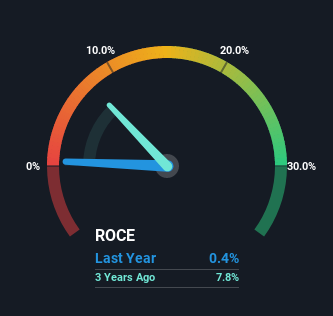What are the early trends we should look for to identify a stock that could multiply in value over the long term? Amongst other things, we'll want to see two things; firstly, a growing return on capital employed (ROCE) and secondly, an expansion in the company's amount of capital employed. Put simply, these types of businesses are compounding machines, meaning they are continually reinvesting their earnings at ever-higher rates of return. However, after briefly looking over the numbers, we don't think Dalata Hotel Group (ISE:DHG) has the makings of a multi-bagger going forward, but let's have a look at why that may be.
What is Return On Capital Employed (ROCE)?
If you haven't worked with ROCE before, it measures the 'return' (pre-tax profit) a company generates from capital employed in its business. The formula for this calculation on Dalata Hotel Group is:
Return on Capital Employed = Earnings Before Interest and Tax (EBIT) ÷ (Total Assets - Current Liabilities)
0.0041 = €7.3m ÷ (€1.9b - €95m) (Based on the trailing twelve months to December 2021).
So, Dalata Hotel Group has an ROCE of 0.4%. Ultimately, that's a low return and it under-performs the Hospitality industry average of 4.9%.
See our latest analysis for Dalata Hotel Group

In the above chart we have measured Dalata Hotel Group's prior ROCE against its prior performance, but the future is arguably more important. If you'd like to see what analysts are forecasting going forward, you should check out our free report for Dalata Hotel Group.
What Can We Tell From Dalata Hotel Group's ROCE Trend?
When we looked at the ROCE trend at Dalata Hotel Group, we didn't gain much confidence. Over the last five years, returns on capital have decreased to 0.4% from 7.3% five years ago. Although, given both revenue and the amount of assets employed in the business have increased, it could suggest the company is investing in growth, and the extra capital has led to a short-term reduction in ROCE. If these investments prove successful, this can bode very well for long term stock performance.
Our Take On Dalata Hotel Group's ROCE
In summary, despite lower returns in the short term, we're encouraged to see that Dalata Hotel Group is reinvesting for growth and has higher sales as a result. And there could be an opportunity here if other metrics look good too, because the stock has declined 22% in the last five years. As a result, we'd recommend researching this stock further to uncover what other fundamentals of the business can show us.
If you're still interested in Dalata Hotel Group it's worth checking out our FREE intrinsic value approximation to see if it's trading at an attractive price in other respects.
While Dalata Hotel Group isn't earning the highest return, check out this free list of companies that are earning high returns on equity with solid balance sheets.
New: Manage All Your Stock Portfolios in One Place
We've created the ultimate portfolio companion for stock investors, and it's free.
• Connect an unlimited number of Portfolios and see your total in one currency
• Be alerted to new Warning Signs or Risks via email or mobile
• Track the Fair Value of your stocks
Have feedback on this article? Concerned about the content? Get in touch with us directly. Alternatively, email editorial-team (at) simplywallst.com.
This article by Simply Wall St is general in nature. We provide commentary based on historical data and analyst forecasts only using an unbiased methodology and our articles are not intended to be financial advice. It does not constitute a recommendation to buy or sell any stock, and does not take account of your objectives, or your financial situation. We aim to bring you long-term focused analysis driven by fundamental data. Note that our analysis may not factor in the latest price-sensitive company announcements or qualitative material. Simply Wall St has no position in any stocks mentioned.
About ISE:DHG
Dalata Hotel Group
Owns, leases, and manages hotels under the Maldron Hotels and Clayton Hotels brand names in Dublin, Regional Ireland, the United Kingdom, and Continental Europe.
Mediocre balance sheet second-rate dividend payer.
Similar Companies
Market Insights
Community Narratives




